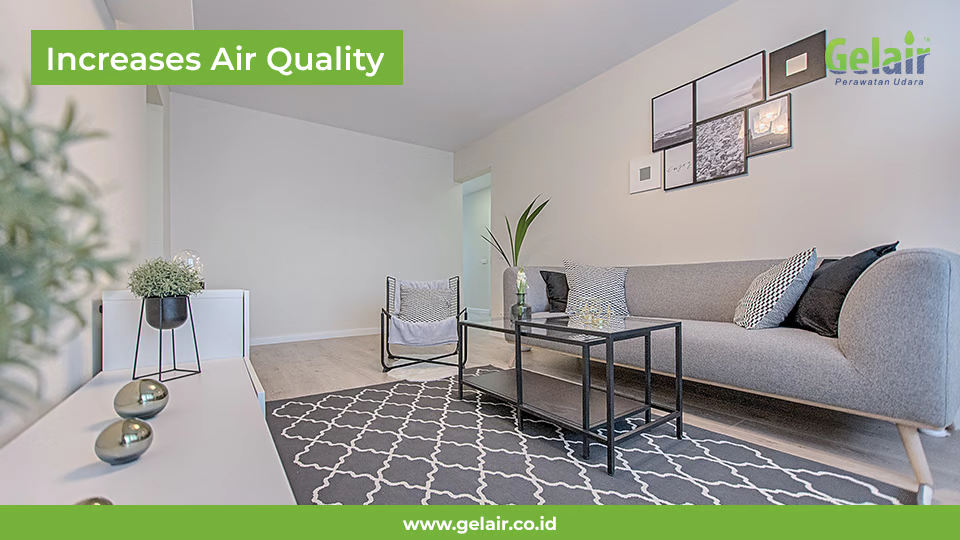Increasing Living Quality Through Air Quality Treatment

Do you concern to the quality of a healthy life through the air you breathe indoors?
Air quality in a room, known as indoor air safety, is a scientific aspect that focuses attention on air quality in a room and the air that will be introduced into the room or building occupied by humans, whether the air used meets health requirements or vice versa.
Indoor clean air is important but often overlooked. Based on many surveys that nearly 90% of people spend most of their time every day indoors: in homes, offices, schools, health care facilities, or other private or public buildings. The quality of the air they breathe in those buildings is an important determinant of their health and well-being. Therefore, inadequate control of indoor air quality creates a considerable health burden.
Knowledge of indoor air quality, its health significance and the factors leading to poor quality is key to enabling action by relevant stakeholders – including building owners, developers, users and occupants – to keep indoor air clean.
Have you ever heard of Sick Building Syndrome?
Sick Building Syndrome (SBS) is a term that refers to a number of allergic symptoms that affect some office workers in a building while they are in the building and gradually disappear after they leave the building.
In Indonesia, the Indonesian Association of Public Health Experts (FKM UI) conducted research on 350 employees from 18 companies in the DKI Jakarta area, the result is that 50% of people who work in office buildings experience SBS. Complaints include headaches, fatigue, flu-like symptoms, shortness of breath, watery eyes, frequent sneezing, stuffy nose and itchy throat.
Based on the objective criteria, the age group that experienced the most SBS was the young age group of 65.5%. For the length of work variable, respondents whose length of work did not meet the requirements, namely > 8 hours/day, had the highest frequency of experiencing SBS, namely 83.3%.
The cause of the Sick Building Syndrome condition is due to indoor air quality being polluted by free radicals (chemicals) originating from inside and outside the room. For example contamination by microbes or caused by poor air ventilation.
Microbial pollution is a key element of indoor air pollution. Formation of excess moisture causes condensation especially where condensation occurs inside the cavity walls of buildings also on all indoor materials causing the growth of microbes, such as mold and bacteria, which further emit spores, cells, fragments and volatile organic compounds into the indoor air . Health-relevant microbial indoor air pollutants are highly heterogeneous, ranging from pollen and plant spores that come primarily from outdoors, to bacteria, fungi, algae and some protozoa that are emitted outdoors or indoors. They also include a wide variety of microbes and allergens that are spread from one person to another.
The traditional way to improve poor indoor air quality is to increase ventilation to remove contaminants. It works well for volatile organic chemicals and bio-effluents such as CO2 and odours, and also works well for suppressing SVOC laden dust.
But what do you do when the outside air quality is worse than the air inside?
Replacing ventilation with the use of air conditioning is an alternative that can create a comfortable atmosphere at work and increase work productivity. But it should also be noted, an air conditioner that does not get enough maintenance/cleaning will make microorganisms feel comfortable to live and nest various types of microbes, fungi, and bacteria and dust.
The use of an air conditioner that mixes with outside air can cause air exchange to occur naturally and can reduce the risk of SBS, compared to a room where the air temperature is fully regulated by the air conditioner.
Gelair Air Treatment is here to be a solution for indoor air quality. Gelair was established on a Tea Tree plantation in northern New South Wales in 1998. Gelair uses Tea Tree Essential Oil as a natural antiseptic to combat and prevent various types of fungi, bacteria, viruses, proven effective in controlling Golden Staph (Staphylococcus aureus) for strains that resistant to Methicillin (MRSA) and Vancomycin (VRSA). After gaining an understanding of the health benefits of Tea Tree Oil, the owner developed a unique biodegradable gel containing Tea Tree Oil for placement in the HVAC system.
Live healthy with GELAIR AIR TREATMENT!